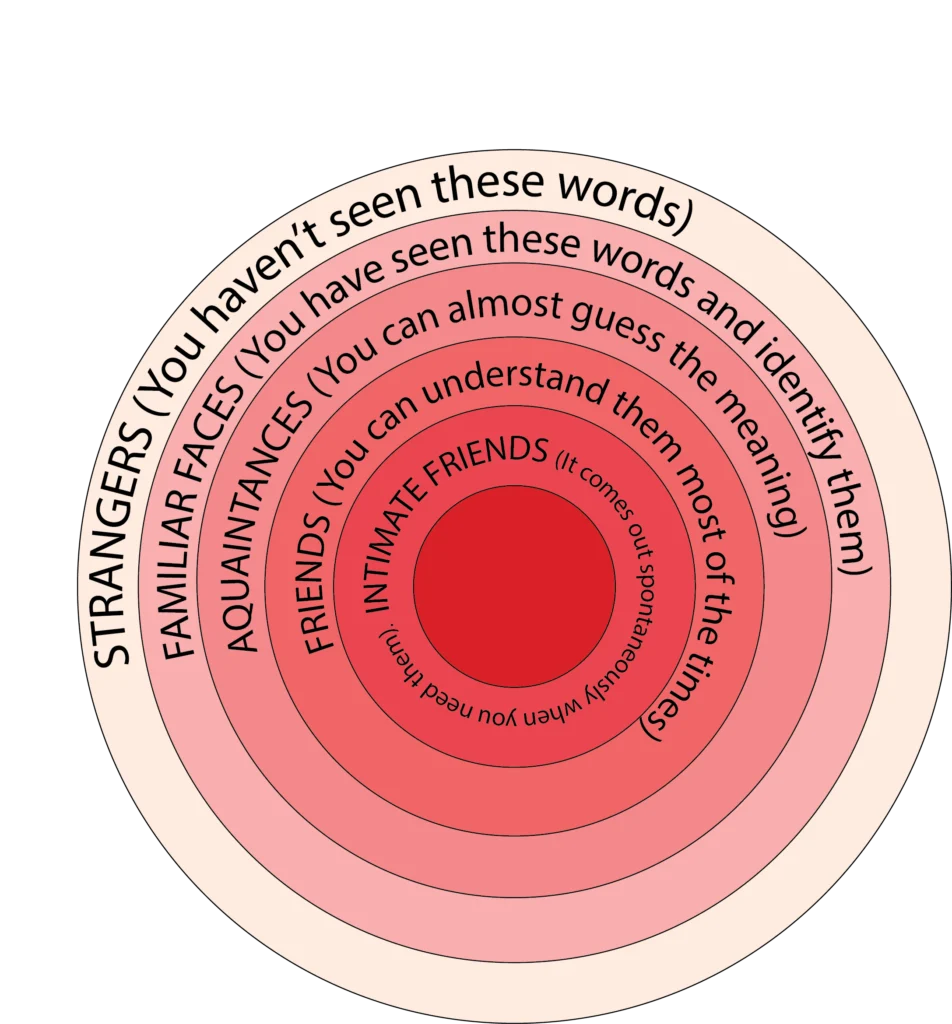English’s vast vocabulary may appear daunting at first, yet is one of the richest languages worldwide with over 600,000 core lexical items
English Vocabulary – Thanks largely to centuries of borrowing words from numerous other tongues into its core lexicon – as its history of assimilation over centuries resulted in it becoming one of the primary tools of communication across millions of speakers around the globe. Yet mastering its vast lexicon may appear an insurmountable task especially when first encountered as non-native speakers.
However, this observation shouldn’t put off enthusiastic learners
Rather, it illustrates the variety and subtle nuances available within English that allow for varied communication styles to emerge. Winston Churchill reportedly used more than 60,000 words when writing; on average native English speakers only use approximately 5,000 in everyday speech.
What this suggests?
This indicates that effective and comfortable communication in English is possible without mastering its vast lexicon, giving hope to those intimidated by its enormous size. This should provide encouragement for anyone hesitant to enter this vast ocean of vocabulary knowledge.
Now the question arises about English Vocabulary
If not all, what are the essential minimum words and how are they obtained?
Socializing With Words’ (SWW) – English Vocabulary
This is an engaging method I recommend in my formal and informal interactions with students and friends to expand vocabulary, with very positive responses receiving this technique as part of their educational experiences. Based on positive response received, SWW was documented on this webpage to share.
How can I increase my English vocabulary?
My reply is this: If you lend an open ear and participate actively while reading, you will soon become acquainted with all the essential words of English that will enable easy, effective communication between yourself and others.
Yes!
Effective communication without knowing all the words in English is entirely possible – read on for details of how.
English Vocabulary Extensity Analysis
The size and scope of English’s vocabulary reflect both its history and capacity for innovation
English has borrowed and adopted words from Latin, French, German, Norse and other sources – this has resulted in a rich tapestry of words with their own subtle nuances of meaning; for instance the term “beautiful” can also be replaced with phrases such as “gorgeous,” “stunning,” or “lovely,” each having different connotations or connotation altogether.
As an outsider looking in at English as their native tongue
This vast vocabulary may appear intimidating at first. Although mastering all these words might seem impossible at first glance, remember that even native speakers don’t utilize all available English terms; rather they select words pertinent to their circumstances, profession and social environment.
Winston Churchill was known for his command of the English language and Vocabulary
Both orally and written. Reportedly using around 60,000 words throughout his works compared to an average native English speaker who typically utilizes only around 5,000 in daily conversation, this contrast shows how large vocabulary does not require effective communication.
Realistic Goal: Functional Vocabulary
Goal of effective communication
Should not be mastering every English vocabulary word; but rather building up a functional vocab that facilitates effective and comfortable exchanges. A functional vocab consists of words frequently employed for daily interactions – including those which affect personal, professional, and social settings – creating effective and comfortable dialogue among individuals and between societies.
Building a functional vocabulary can be more realistic and achievable goals
Relieving pressure off learners while making learning enjoyable. One approach I suggest using to expand this functional vocabulary is through what is known as Socialising with Words (SWW).
Communicating Through Words: An Overview of Concept


Socialising through words stems from how humans naturally engage with their environment
Humans are social beings; we’re naturally curious and aim to form meaningful connections with those in our surroundings; harnessing this social nature can lead to creating an efficient vocabulary.
As soon as you move to a new area, everyone around you is unfamiliar
Over time as you interact with people and form friendships with acquaintances and strangers alike, names become familiar, with some becoming close enough that acquaintances become friends. A similar process happens with reading new books: many words will initially seem unfamiliar and unfamiliar words becoming increasingly frequent throughout your reading sessions until eventually you look them up to learn their meaning and become acquaintances, eventually turning into true friends themselves!
Step-by-Step Guide to Socialising with Words
1. Expose Yourself
To develop socializing with words, the initial step must be exposure. This can be accomplished by reading widely and listening to various forms of media – books, newspapers, magazines, podcasts and videos are excellent sources for new vocabulary; focus on finding content that interests you!
2. Understanding Vocabulary Contextually
Step two is understanding words contextually. When encountering unfamiliar terms, try inferring their meaning from context. Pay particular attention to how a word is being used within sentences or passages so as to gain some indication as to its potential meaning. Hopefully this step will allow for easy comprehension!
Example:
Upon encountering the word “gregarious” in an expression such as: “She was known for being outgoing and friendly”, one can conclude that being “gregarious” means being social or outgoing.
3. Familiarization through Repetition
Repetition is key when learning a new word; seeing it over and over in different contexts helps cement it in our memory, so reading/listening to different content helps reinforce exposure of that particular word, eventually becoming familiar over time. The more often we come into contact with something new, the easier it will become familiar.
4. Active Engagement
Engaging actively involves seeking out unfamiliar words and making an effort to use them regularly. If you come across an unfamiliar term, take the time to look it up in a dictionary; write out its meaning along with an example sentence so as to reinforce your comprehension of it. This process should further aid comprehension.
Search the word ‘gregarious,’
For instance. Write “Gregarious (adj.) – Sociable and outgoing; an example would be John who makes every party unforgettable with his exuberance and lively nature.”
5. Practical Application
Once your new words have been learned and understand the concepts they represent, use them in everyday communication – whether writing or verbally. Incorporate these new terms into sentences and conversations so they become part of everyday language use and become easier over time. The more familiarity with them that develops.
Example:
“Sarah is very sociable; she enjoys meeting new people and creating friendships.
Words Can Increase Social Connections — Benefits
Participating in verbal exchange has several advantages
Natural Learning Process
This technique mimics how humans naturally acquire knowledge. As such, learning new words feels both organic and enjoyable for everyone involved in the process.
Contextual Understanding
By comprehending words within context, you gain a deeper insight into their meanings and subtle nuances – this makes for more accurate communication when using these terms in real-life scenarios.
Long-Term Retention
Repetition and active engagement can ensure new words stay put in your memory for an extended period. This adds depth and breadth to your vocabulary.
Confidence in Communication
By expanding your functional vocabulary, you’ll become more secure with yourself when speaking out publicly; your expression of ideas will become clearer and more concise than before.
Increased Language Skills
Expanding your vocabularies enhances all areas of language abilities – reading comprehension, writing proficiency and speaking fluency among them.
Reading and Listening as Key Foundations of Vocabulary Building
To successfully engage in conversations through words
It is crucial that you develop strong reading and listening habits. Reading provides exposure to new words while listening helps interpret their context in context.
Reading can be one of the best ways to expand your vocabulary
Opening you up to new words and contexts. Here are a few strategies for making the most out of reading practice:
Diverse Reading Material
Expose yourself to various genres and topics by reading fiction, non-fiction books, newspapers, magazines and online articles in your reading list. Doing this will introduce new styles of writing as well as expand your vocabulary. Include fiction novels as well as nonfiction works within this reading list.
Make Reading Part of Your Routine
Make reading an integral part of daily life by setting aside 15-20 minutes each day just for reading – even small changes such as this can dramatically expand vocabulary!
Active Reading
Take an active approach when engaging with text. Highlight unfamiliar words, take notes on them and research their meanings as much as possible in context of how the words are being used in sentences or paragraphs.
Reading Aloud
Reading aloud can help improve pronunciation and retention of new vocabulary while at the same time giving an idea of its rhythm and flow.
Book Recommendations for better English Vocabulary
Seek book recommendations from friends, teachers or online communities and select books suitable to your reading level and interests.
Listening is another effective means of expanding one’s vocabulary
Listening can help one understand pronunciation, intonation and usage in real time – here are a few strategies for increasing listening practice:
Start listening to different sources
Such as podcasts, audiobooks, radio shows, news broadcasts and videos; this will expose you to various accents, dialects and contexts.
Active Listening
Focus carefully on what words and phrases the speaker uses; attempt to comprehend their meanings and usage within sentences.
Note-Taking
Keep a notebook close at hand so you can jot down unfamiliar words and phrases, look up their meaning later, and review regularly.
Repeating and Shadowing
Repeat what you hear to practice pronunciation and intonation, while shadowing involves listening to sentences spoken aloud, then repeating them back immediately as closely to matching their tone and pace as possible.
Interactive Listening
Engaging in dialogues with native speakers or language partners provides invaluable experience using new words and phrases in everyday conversations.
Practical Advice on Constructing an Effective Vocabulary
Building a functional vocabulary requires consistent effort and practice
Here are a few practical suggestions to get you on your journey:
1. Establish Realistic Goals
Set manageable vocabulary goals. Begin with just a small handful to learn each week and increase as necessary as you become more comfortable with this process.
2. Create Flashcards
Make flashcards of new words and their definitions, then review them regularly in order to strengthen your memory. Physical flashcards or digital apps may work for this task.
3. Create and Maintain a Vocabulary Journal
Maintain a vocabulary journal to record new words, their definitions and example sentences as they come in. Make time each week for reviewing this journal so as to refresh your memory of these important concepts.
4. Engage in Word Games
Engaging in word games such as Scrabble, crossword puzzles and word searches can make vocabulary building enjoyable while helping reinforce learning.
5. Practice Writing
To become comfortable using new words and idioms you have just acquired, incorporate them into your writing practice by including them into essays, stories or journal entries utilizing them. By writing with new vocabulary in mind this way you’ll become more at home using them and become adept with using them properly in essays, stories or journal entries.
6. Join a Reading Group
Consider joining a book club or reading group to exchange opinions and learn vocabulary together, creating an optimal collaborative learning environment to expand your lexicon skills. This collaborative experience could make an excellent way for expanding vocabulary abilities!
7. Solicit Feedback
Seek the advice of teachers, friends and language partners regarding your writing and speaking performances. Gaining constructive criticism can help identify areas for improvement as well as enhance vocabulary usage.
Consistency Is Key
Maintain a regular vocabulary practice session. Even small, consistent efforts will show significant results over time.
Technology as an Aid in Vocabulary Acquisition
Technology has revolutionized our ability to learn foreign languages and expand vocabulary
There are various digital resources and tools available that can aid your efforts at vocabulary expansion – here are just a few ways it can assist:
1. Language Learning Apps
Language-learning apps like Duolingo, Memrise and Anki provide interactive lessons and flashcards for vocabulary acquisition. Utilizing gamification techniques makes language acquisition fun and engaging!
2. Online Dictionaries
Online dictionaries such as Merriam-Webster, Oxford and Cambridge provide detailed definitions, pronunciations and example sentences; as well as offering thesaurus services that allow users to discover synonyms and antonyms of words they don’t already know about.
3. Vocabulary Websites
Vocabulary.com and Quizlet provide quizzes, word lists, practice exercises and personalized learning plans to expand your vocabulary. They track progress as you go and help create personalized plans to accelerate development of vocabulary skills.
4. Audiobooks and Podcasts (for your listening convenience).
Audiobooks and podcasts provide great listening practice resources. Platforms like Audible, Spotify and Apple Podcasts have plenty of content suitable to suit various interests.
5. Language Exchange Platforms
Tandem and HelloTalk offer language exchange platforms where users can meet native speakers to practice speaking their native tongue, engage in dialogues with them and gain feedback while discovering new words for specific context.
6. E-Readers
E-readers like the Amazon Kindle make it possible for readers to instantly look up word definitions while reading, as well as provide features for highlighting, note-taking and vocabulary development.
Overcoming Challenges of Vocabulary Development
Building a functional vocabulary can be both rewarding and difficult
Here are some challenges you might come up against as well as ways to overcome them:
1. Overwhelm
The English vocabulary may seem daunting at times. Focus on learning one or two new words at a time to gradually increase your vocabularies over time, breaking goals down into smaller, manageable tasks.
2. Forgetfulness
It can be easy to forget new vocabulary words when they are not regularly utilized, which is why reviewing your vocabulary journal, flashcards and notes regularly to reinforce memory may help prevent future loss.
3. Pronunciation Difficulties
Some English words have difficult pronunciations; use online dictionaries or language learning apps to listen to and practice saying out loud their correct pronunciations until you feel more at ease with saying them aloud.
4. Lack of Context
Finding words out-of-context can be challenging. To effectively grasp their meaning and usage, reading or listening to varied content will aid greatly in helping you comprehend them in context.
Maintaining motivation over an extended period is challenging
Set realistic goals, track your progress, and celebrate achievements along the way. Join language learning communities to stay inspired and motivated!
Conclusion: Welcome the Journey


Building a functional vocabulary requires patience, persistence and passion
Socializing with words can make this journey enjoyable and fulfilling; don’t strive to master every single English word but aim instead for creating a comfortable lexicon which allows you to communicate confidently.
Read widely, listen carefully and use new words when conversing
Be open-minded as the process unfolds – this way your vocabulary will grow steadily while your language skills expand!
Socialising with words is an organic and enjoyable way to build your English vocabulary
By reading and listening to various materials, understanding context, and actively engaging with new vocabulary words you’re exposed to, developing functional and versatile vocabularies will become second nature and enhance communication abilities.
Effective communication does not depend on knowing every single word in a dictionary
Rather, it involves using those you already have in order to express yourself clearly and confidently. Take the first steps on this journey today: Read, listen to others talk with words and watch how quickly your vocabulary grows!




